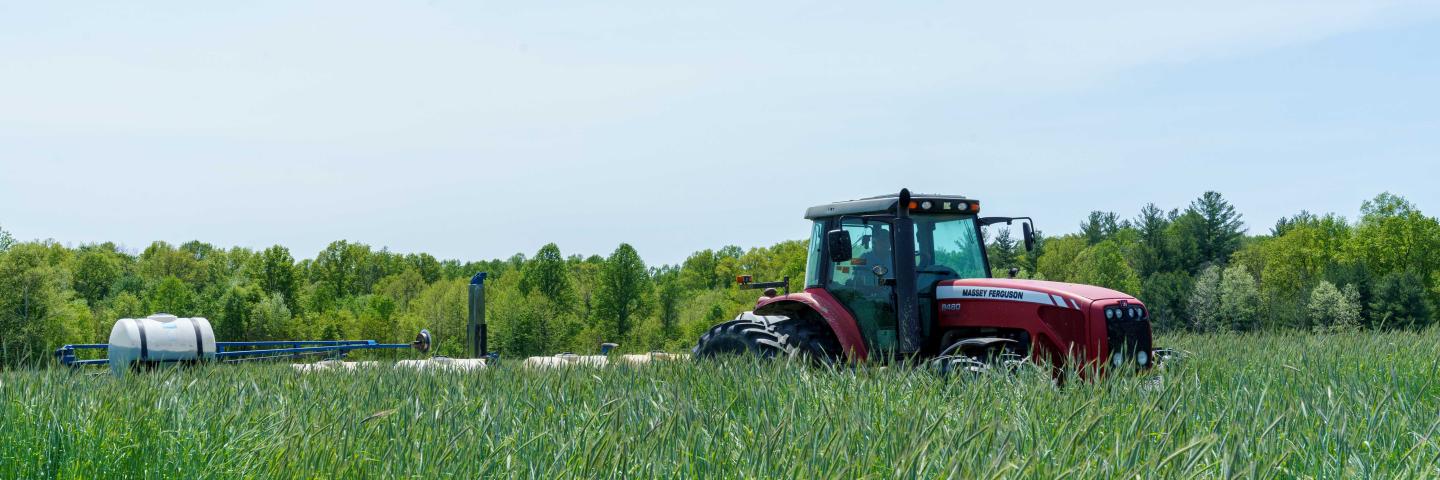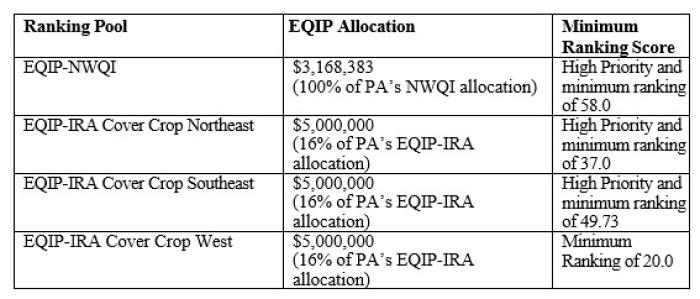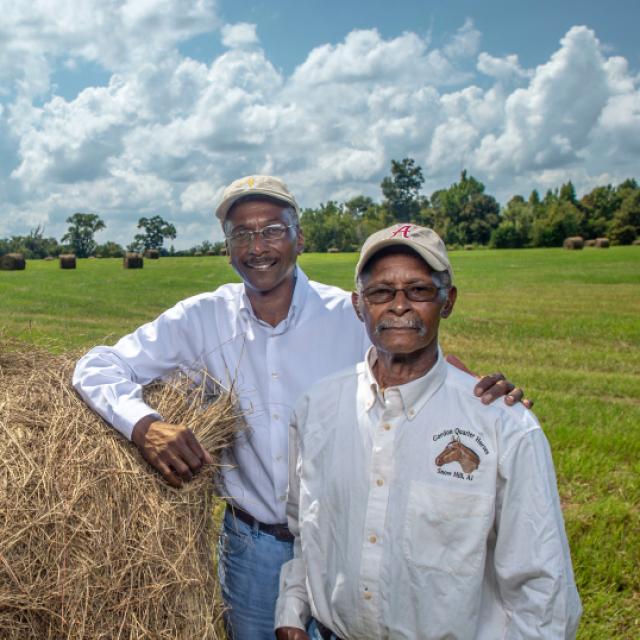
The Environmental Quality Incentives Program (EQIP) is NRCS’ flagship conservation program that helps farmers, ranchers and forest landowners integrate conservation into working lands.
On This Page
Introduction
The Environmental Quality Incentives Program (EQIP) is a voluntary conservation program that helps agricultural producers in a manner that promotes agricultural production and environmental quality as compatible goals. Through EQIP, agricultural producers and forest land owners can receive financial and technical assistance to implement structural, vegetative and management conservation practices that optimize environmental benefits on working agricultural and forest land.
Eligibility
Agricultural producers and owners of non-industrial private forestland are eligible to apply for EQIP. Eligible land includes cropland, pastureland, non-industrial private forestland and other farm lands.
Applicants must:
- Control or own eligible land
- Comply with adjusted gross income limitation (AGI) provisions
- Be in compliance with the highly erodible land and wetland conservation requirements
- Develop an NRCS EQIP plan of operations
Additional program requirements may apply.
EQIP Program options and Payment Rates
Pennsylvania EQIP Program Options
EQIP ACT NOW Ranking Threshold Information:

Application Information
EQIP applications are accepted on a continuous basis; however, NRCS establishes "cut-off" or submission deadline dates for evaluation, ranking and approval of eligible applications. EQIP is open to all agricultural producers including operators of non-industrial private forestland, or landowners of these lands. Submitted applications may be considered or evaluated in multiple funding pool opportunities.
To apply for EQIP, visit your local service center (See "Find Your Local Service Center" at the bottom of this page) or Get Started with NRCS.
Socially Disadvantaged, Beginning, and Limited Resource Farmers/Ranchers, Military Veteran Farmers
The 2018 Farm Bill continues to address the unique circumstances and concerns of socially disadvantaged farmers and ranchers, as well as beginning and limited resource farmers and ranchers and Veteran Farmers. It provides for voluntary participation, offers incentives, and focuses on equity in accessing U.S. Department of Agriculture (USDA) programs and services. Enhancements include increased payment rates and advance payments of up to 50 percent to purchase materials and services needed to implement conservation practices included in their EQIP contract.
Pennsylvania is committed to reaching out to Historically Underserved individuals and groups. Historically Underserved participants may also receive higher payment rates in addition to being considered in high priority funding pools. See the Small & Limited and Beginning Farmers and Ranchers page for the NRCS definition of the Historically Underserved.
National and State Priorities
The following national priorities, consistent with statutory resources concerns that include soil, water, wildlife, air quality, and related natural resource concerns, may be used in EQIP implementation:
- Reductions of non-point source pollution, such as nutrients, sediment, pesticides, or excess salinity in impaired watersheds consistent with total maximum daily loads (TMDL) where available; the reduction of surface and groundwater contamination; and the reduction of contamination from agricultural sources, such as animal feeding operations
- Conservation of ground and surface water resources
- Reduction of emissions, such as particulate matter, nitrogen oxides, volatile organic compounds, and ozone precursors that contribute to air quality impairment violations of National Ambient Air Quality Standards
- Reduction in soil erosion and sedimentation on agricultural land
- Promotion of at-risk species habitat conservation including development and improvement of wildlife habitat
- Energy conservation to help save fuel, improve efficiency of water use, maintain production, and protect soil and water resources by more efficiently using fertilizers and pesticides and
- Biological carbon storage and sequestration
In addition, Pennsylvania has identified the following priorities:
- Livestock: address natural resource concerns related to storage, treatment, and management of animal waste.
- Cropland: assist producers with resource concerns on cropland such as soil quality, erosion control, and with water conservation on irrigated cropland.
- Water Quality: assist producers with installing conservation practices such as Waste Storage Structures, Heavy Use Area Protection, Riparian Buffers, Cover Crops, Filter strips and Waterways to address phosphorus, bacteria, and sediment impairments which may be caused by soil erosion, exposed soil, and lack of riparian buffers and filter strips.
- Erosion control: producers with non-industrial private forestland may receive financial assistance to develop a forest stewardship plan or to implement practices within an approved forest stewardship plan.
- Wildlife habitat enhancement: Pennsylvania targets Golden Winged Warbler and Bog Turtle Habitat improvements to reverse the decline and benefit other species with similar habitat needs.
(For information on RCPP-EQIP opportunities, go to the RCPP page.)
Program Contact:
Jared Shippey
Assistant State Conservationist for Programs
717-237-2216
Additional Information
Apply for Environmental Quality Incentives Program (EQIP)
The Environmental Quality Incentives Program (EQIP) provides financial and technical assistance to agricultural producers and non-industrial forest managers.
Learn MoreHistorically Underserved Farmers and Ranchers
The Agriculture Improvement Act of 2018 (2018 Farm Bill) includes provisions that address the unique circumstances and concerns of socially disadvantaged, beginning, limited resource, and veteran farmers and ranchers (“historically underserved producers”).
Learn MoreFarm Bill
The 2018 Farm Bill was enacted on December 20, 2018. The Farm Bill continues its strong support for conservation efforts of America’s farmers and ranchers through reauthorization and expanded flexibility of NRCS conservation programs.
Learn MoreReady to get started?
Contact your local service center to start your application.
How to Get Assistance
Do you farm or ranch and want to make improvements to the land that you own or lease?
Natural Resources Conservation Service offers technical and financial assistance to help farmers, ranchers and forest landowners.

To get started with NRCS, we recommend you stop by your local NRCS field office. We’ll discuss your vision for your land.
NRCS provides landowners with free technical assistance, or advice, for their land. Common technical assistance includes: resource assessment, practice design and resource monitoring. Your conservation planner will help you determine if financial assistance is right for you.
We’ll walk you through the application process. To get started on applying for financial assistance, we’ll work with you:
- To fill out an AD 1026, which ensures a conservation plan is in place before lands with highly erodible soils are farmed. It also ensures that identified wetland areas are protected.
- To meet other eligibility certifications.
Once complete, we’ll work with you on the application, or CPA 1200.
Applications for most programs are accepted on a continuous basis, but they’re considered for funding in different ranking periods. Be sure to ask your local NRCS district conservationist about the deadline for the ranking period to ensure you turn in your application in time.
As part of the application process, we’ll check to see if you are eligible. To do this, you’ll need to bring:
- An official tax ID (Social Security number or an employer ID)
- A property deed or lease agreement to show you have control of the property; and
- A farm number.
If you don’t have a farm number, you can get one from USDA’s Farm Service Agency. Typically, the local FSA office is located in the same building as the local NRCS office. You only need a farm number if you’re interested in financial assistance.
NRCS will take a look at the applications and rank them according to local resource concerns, the amount of conservation benefits the work will provide and the needs of applicants. View Application Ranking Dates by State.
If you’re selected, you can choose whether to sign the contract for the work to be done.
Once you sign the contract, you’ll be provided standards and specifications for completing the practice or practices, and then you will have a specified amount of time to implement. Once the work is implemented and inspected, you’ll be paid the rate of compensation for the work if it meets NRCS standards and specifications.

